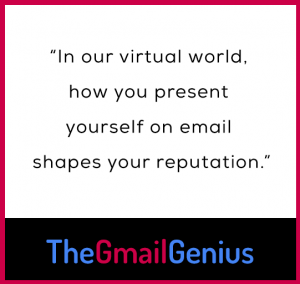How I Email: Elise Gelwicks, Founder, Eleview Consulting
Email is a non-negotiable part of everyday life. For some, it’s an unruly time suck, but enlightened email users have systems to ensure they’re not a slave to the inbox. We’re asking smart thinkers to give us a peek inside their inboxes, share tips, ideas, gripes, and everything in between.
Elise Gelwicks is the CEO of Eleview Consulting, a firm that specializes in helping companies transition their young professionals into the dynamic working world. Elise shared best practices from her professional correspondence workshop on how to write an email that elevates your reputation.
 What’s your daily approach to email?
What’s your daily approach to email?
I’m an obsessive email checker. My Gmail inbox is always open in my browser and I tend to check my inbox every time I see a new message come through. After reading “Deep Work” by Cal Newport, I’ve started signing out of my email when I need to focus. I’ll turn off my internet connection for a few hours to allow myself to get in the zone when creating a new professional development workshop for a client or drafting a complex proposal. This has been hugely effective because I can focus on one specific project without having to context shift as new emails come through.
I try to keep my inbox to less than five unread emails at any given time. For the most part, I respond right away out of respect for the other person and to be most efficient. I mark emails as unread when they require an in-depth response.
What’s the one thing you think everyone’s inbox could benefit from?
I recommend everyone take advantage of the email tracking feature in CRM tools such as Hubspot or Nimble. This allows you to see if someone has opened your email without them being aware that you’re able to see this. You can even see what time they opened your email, and if they’ve opened it several times.
The value comes when you’re not sure if you should follow-up with someone. You’re able to see if your email got lost in their inbox or if they’ve recently opened your email and are waiting to reply for a particular reason. If someone hasn’t replied to my email in a week or two, and I see they haven’t opened my email since I sent it, I’ll send them a follow-up. If I see they’ve opened my email and marked it unread seven times over the last two days, I know that I don’t need to follow-up because they are aware it’s in their inbox.
You specialize in helping young professionals develop their soft skills. What are some of the biggest email mistakes you see recent college grads making when it comes to email?
My firm specializes in teaching interpersonal and communication skills to young professionals. The most common skill our corporate clients ask us to focus on with their teams is email best practices.
The biggest mistake I see people making is writing long paragraphs and using an overly formal or informal tone.
Three best practices:
✔️ Make it skimmable: Use short paragraphs, no more than two or three sentences each, so your email is skimmable. Use bullet points to convey key points and bold or underline the main message. Someone should be able to have a good sense for what’s in your email by scanning it for 3 seconds.
✔️ Start with an appropriate greeting: Begin your email with “Hi [Insert Name]” rather than “Hey [Insert Name]”. End your email with “Thanks, [Your Name]” or “Take care, [Your Name].” Young professionals often close emails with “Sincerely” which is too formal. These small tweaks reflect a more professional and appropriate tone for work emails.
✔️ Clearly state next steps or the main point: Your main message, or the requested action item for the recipient, should be made clear in the first paragraph of your email and restated at the end of your email. This ensures the other person knows exactly what is needed of them. Make it easy for them to absorb the critical information or grasp what they need to do.

What advice do you have for managers and teammates who want to help younger colleagues with poor email etiquette?
Young professionals appreciate clear direction on what is expected of them. When advising them on email etiquette, give them examples of poorly written communication and well-written communication, as well as templates they can follow.
This makes it easy for them to change their behaviors because they have examples they can reference.
Final thoughts?
In our virtual world, how you present yourself on email shapes your reputation. Take the time to consistently write concise, grammatically correct emails to enhance your reputation as a strong and thorough communicator.